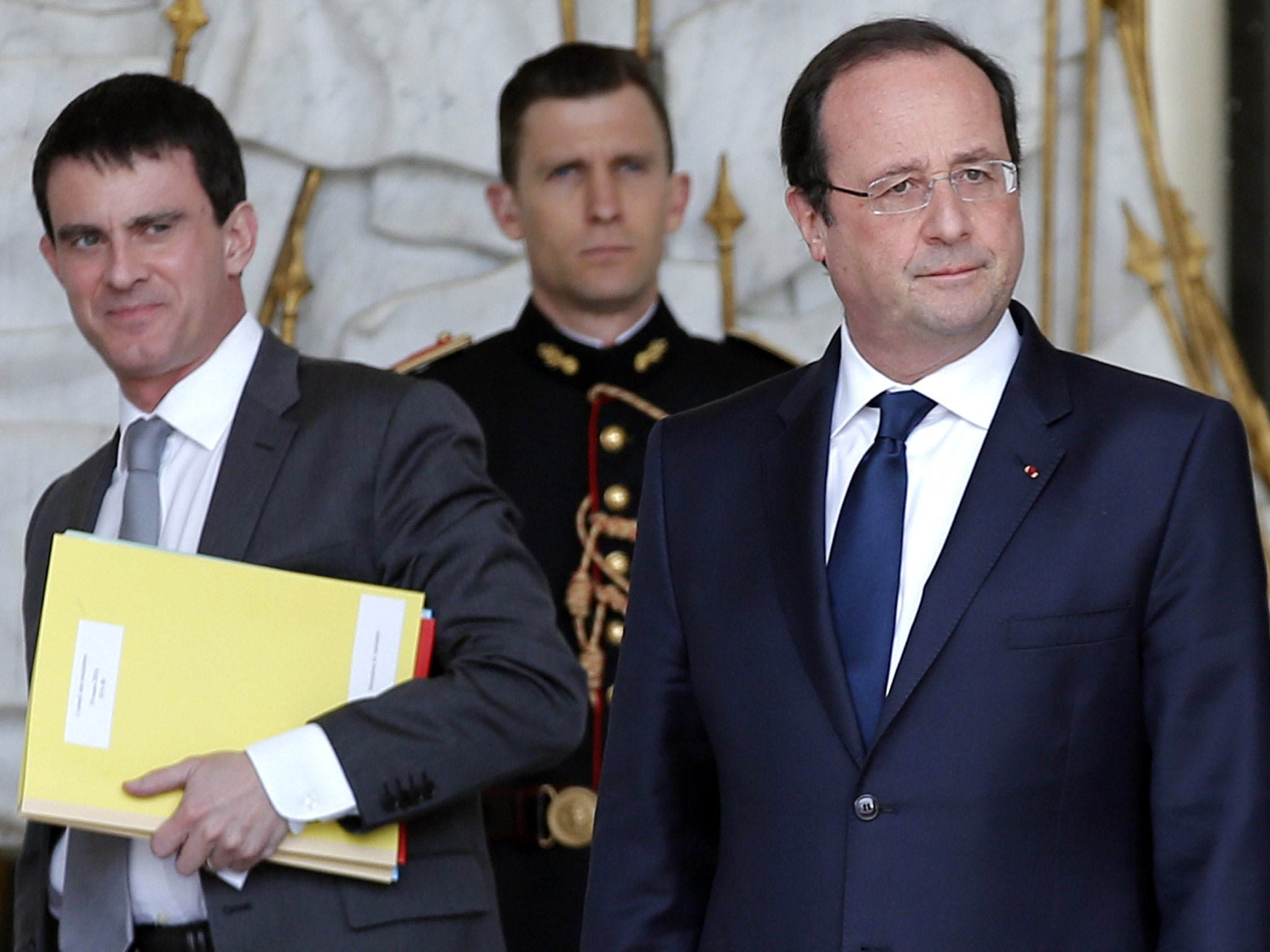The arrival of Prime Minister Manuel Valls has set a new French revolution in train
He has three years to begin to turn France around

France has entered unknown political territory. Never before has there been such a gulf of popularity – 40 points – between a prime minister and a president.
President François Hollande has slumped to an even lower all-time low – 18 per cent – in the latest IFOP poll. His newly appointed PM, Manuel Valls, has a stratospheric inaugural rating of 58 per cent, making him the most popular “second choice” prime minister of the last half century.
It is as if the French people have written off Mr Hollande, after only two years in the Elysée Palace. They have concluded that Mr Valls is now the true leader of France. As one commentator put it, Mr Hollande has been relegated to the rank of the ceremonial presidents of the Fourth Republic (pre-1958), good only for “opening chrysanthemum shows”.
Maybe. French political opinion is so febrile, and the country’s problems so intractable, that Mr Valls will not remain popular for very long. President Hollande is a poor communicator but an able political operator. He will not easily be brushed aside. All the same, a strange kind of French revolution seems to be under way.
In the cumbersome architecture of the Fifth Republic, created by and for Charles de Gaulle, the president is supposed to be the political commander in chief. The PM is supposed to be his adjutant or grand vizier.
It is the PM’s job to become unpopular. He tackles the country’s everyday problems while the president, like a republican monarch, sets broad strategy and symbolises the hopes and aspirations of the nation.
That pattern has been scrambled on three occasions since 1986 by the “co-habitation” of presidents and prime ministers across the left-right divide. The PM, with a majority in parliament, then became the most important political figure.
The system was also tipped on its head by the hyperactive former president Nicolas Sarkozy, who insisted on being, de facto, his own prime minister.
François Fillon, the nominal PM, remained broadly popular. It was Mr Sarkozy’s ratings which plummeted.
All the same, the widest popularity gap between Mr Sarkozy and Mr Fillon was around 20 per cent. The 40 per cent chasm between Mr Hollande and Mr Valls suggests that French voters have written off the President after the calamitous results for the left in local elections last month.
They have given Mr Valls the kind of introductory “ratings” bonus which usually goes to newly elected leaders – even though Mr Valls was not elected, but appointed by Mr Hollande.
“For the French people, the boss is now Manuel Valls,” wrote the Journal du Dimanche. “Two years after his election, the head of state and the French people have divorced.”
One Socialist parliamentarian said: “We are back in a kind of unspoken cohabitation. The President and Prime Minister come from the same party. But it is the Prime Minister, not the President, who is calling most of the shots.”
Mr Valls, 51, has been called a “French Tony Blair” and a “Socialist Sarkozy”. He is energetic, ambitious and plain-speaking. Unlike Mr Hollande – and unlike the dumped prime minister, Jean-Marc Ayrault – he has political sex-appeal.
In his highly successful first speech to parliament last week, Mr Valls appeared to pursue the new, more business-friendly economic policy announced by President Hollande in January: state spending would be cut, as promised by Mr Hollande, by €50bn (£41bn) in three years; pay-roll taxes that burden French industry would be reduced.
Mr Valls, however, went further. He announced even more cuts in business taxes and a reduction in pay-roll taxes for the lowest paid. He also promised to start the long-delayed “big bang” of the sprawling and multi-layered French state, halving the number of regional governments and abolishing the départements or counties.
Perhaps even more importantly, Mr Valls found the kind of stirring, but realistic, language and “narrative”, which had been missing. He spoke not like a prime minister, but like a president: yes, France is in a mess; yes, one in five young people is unemployed; yes, painful choices must be made. But France also has many advantages and resources – look at me, an immigrant child who has become Prime Minister. In how many countries could that happen? (Mr Valls was born in Barcelona and became a French citizen at the age of 20.)
Exploiting personal history in this way, he is reminiscent not so much of Mr Blair or Mr Sarkozy, but of the young Bill Clinton.
The comparison with Mr Blair is, in any case misleading. Like Mr Blair, Mr Valls wants to break the right-wing monopoly of being tough on crime. Like Mr Blair, Mr Valls believes that socialist parties must abandon statist ideology to survive and succeed in the 21st century.
But Mr Blair was elected leader of a party which accepted (mostly) that it must change after the Thatcher years. In France, there have been no Thatcher years. Mr Valls has not been elected leader of his party. He is far to the right of most socialist members of parliament, and even further to the right of the Socialist Party grassroots.
He has three years to begin to turn France around. The perverse nature of the French political system suggests that, even if he does partially succeed, he is doomed to become very unpopular, very quickly.
If he breaks that pattern, he may, de facto, have achieved something even more difficult – the creation of an agile, reformist and business-friendly French centre-left.
Who, then, would run for president in 2017, Mr Hollande or Mr Valls?
Join our commenting forum
Join thought-provoking conversations, follow other Independent readers and see their replies
Comments